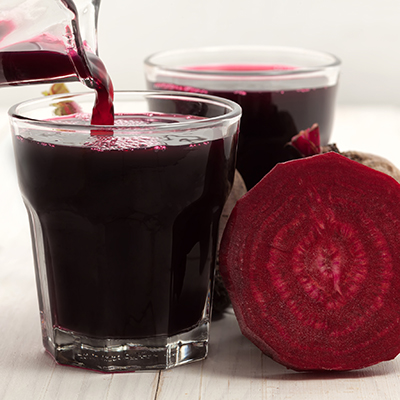The Buzz: Beet Juice for Sports
- by bonappetit
 What’s the buzz?
What’s the buzz?
Beet juice is the latest ergogenic aid guaranteed to take you to your next personal record or big win.
What does the science say?
From U.S. Olympic marathon runner Ryan Hall to several of the Canadian XC ski team members, elite athletes are guzzling bright red beet juice to boost their performance.
Could this humble root vegetable really give you a competitive edge? Several studies suggest that it may increase your time before exhaustion and shave a few seconds off your next road race. Beets are a good source of nitrates (from the soil in which they grow) that when consumed are converted to nitrites (by the good bacteria in your mouth) and eventually into nitric oxide, which is said to increase the amount of oxygen delivered to your muscles. You might be thinking: Aren’t nitrates and nitrites the ingredients we’re supposed to avoid in processed meats? It turns out, whether nitrates are harmful or helpful depends where they are found. Sodium nitrate or nitrite (the kind added to many brands of bacon, sausage, and deli meat) reacts with the amines in the meat to form nitrosamines, which have been linked to increased risk of cancer. The naturally occurring nitrates in plant foods like beets, on the other hand, may actually offer some benefits (and aren’t dangerous for your health when consumed from whole foods).
So, how much do you need to drink to see results? Most of the research is based on 70 to 140 milliliter (2.5- to 5-ounce) “shots” of concentrated beet juice, which equals about 300 to 600 milliliters (10 to 20 ounces) of regular beet juice. It appears that most of the benefits lie in endurance sports rather than shorter, high-intensity workouts or strength training. While some reports suggest that there is a dose response— meaning drinking a serving per day over the three to four days prior to your big event is the best bet — others recommend one to two shots of the concentrate two to three hours before your event. It’s important to note that the difference in performance may only be a few seconds. For elite athletes that could mean the difference between being on the podium or not — but for the weekend warrior, it may not be a meaningful difference.
What’s the takeaway?
Drinking a glass (or shot) of beet juice before an athletic performance may provide a small boost with little risk. Though, some anecdotal evidence suggests some people experience digestive woes if beet juice is consumed too close to competition, so always test out new foods and drinks during training. Beets also offer a variety of antioxidants, which may help with recovery, and at the very least, are a good source of vitamin C, iron, magnesium, and potassium.
Read more: